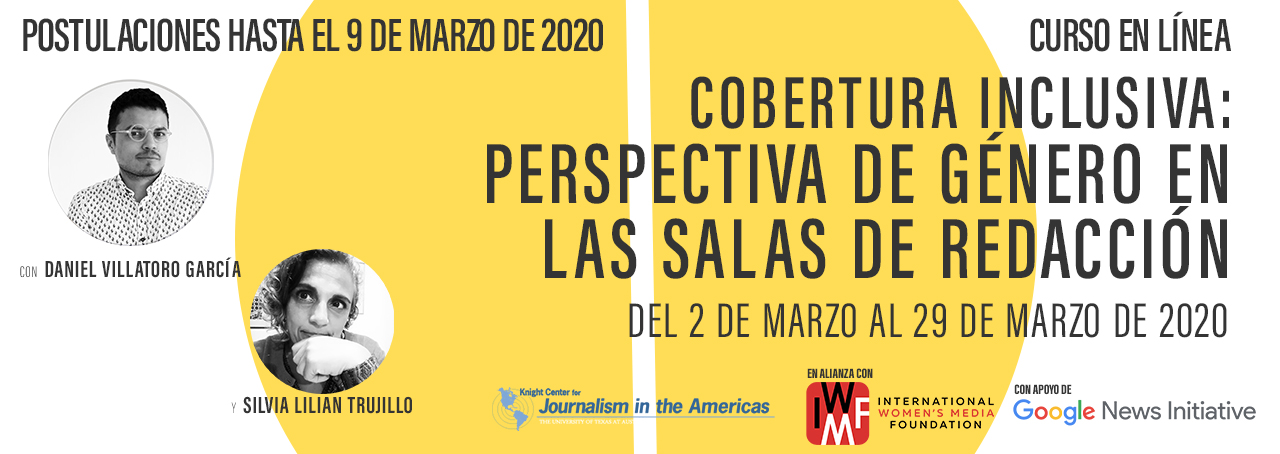A new course from the Knight Center for Journalism in the Americas, in partnership with the International Women’s Media Foundation and supported by the Google News Initiative, will provide strategies and tips for covering different genders and identities.
The Spanish-language course, “Inclusive coverage: gender perspective in the newsroom,” will run March 2-29 and will be led by instructors Silvia Trujillo and Daniel Villatoro.

This exciting new course will explore best practices for covering gender-related topics. While geared toward editors, the course will be relevant to those leading gender-related coverage adn those producing it. Anyone who's interested in the topic of gender perspective in newsrooms is invited to apply between now and March 9. We will be reviewing applications over the next two weeks and will accept students into the course on a rolling basis. Seats are limited.
“We are very excited to be offering, for the first time, a course on gender perspective. We want to help newsrooms deepen their understanding of how to cover different genders and identities, and provide them with practical tips and action plans along the way,” said Rosental Alves, director of the Knight Center. “With Google News Initiative’s support, and IWMF’s partnership, we’re able to make this possible.”
The goal of the course is to learn the basic concepts about gender and understand the methodology of applying a gender approach to journalism. Students will develop an action plan to identify areas for improvement and propose initiatives to apply a gender perspective in their own newsrooms.
The course is divided into four weekly modules.
“Media content has a two-way relationship with society: the stories in newspapers are a reflection of our reality and our cultural values... but at the same time our culture is influenced by the stories we see in the media,” Villatoro said. “Knowing that LGBTIQ people exist (through contact with others or contact with a story about them in the media) encourages understanding and combats prejudice-based misinformation, as has been proven in various studies.”
Instructors will teach the course using videos, multimedia presentations, readings, discussion forums and quizzes. They will also provide 1:1 feedback to students in the course and wil guide students in the creation of a final project that they can implement in their own work and newsrooms.
Trujillo is on the communications team for feminist publication laCuerda. She previously worked for Centro Civitas and the magazine Sala de redacción, where she coordinates the Women and Media Observatory and monitors representation of women in the media. She is also author of Espejos rotos (Broken mirrors), which looks at the situation of women journalists in Guatemala. She has also been a columnist for various media outlets, including Sala de Redacción, Esquisses, Plaza Pública and ContraPoder, among others.
“The media constitute a filter from which people interpret ‘reality’ and in that context it is very important that the perspectives presented to their audiences are equitable and respectful of the social diversity that surrounds them,” Trujillo said. “In other words, the media, the narratives that people who work in the media build, do have the potential to contribute to the formation of societies that question gender roles and respect different identities.”
Villatoro is lead trainer of Exprésate, a Latin American Journalism Initiative about LGBTIQ+ communities with the International Women’s Media Foundation. He is also executive director of Visibles, a communications project on LGBTIQ+ populations in the public agenda in Guatemala. He has written for media outlets like ProPublica, Univisión, Radio Ambulante, Factum, Convoca and more. He was a trainer at SocialTIC and coordinated the Data School program for Latin America. He also previously developed investigations based on data analysis at Guatemalan site Plaza Pública.
“When I edit, my role makes me change my thinking and go from being the producer to being the proofreader and polisher of someone else's report. Many times in this exchange between the proposal of who made the report and who edited it, changes occur in which the gender perspective is not considered,” Villatoro said. “Many of these actions are also unconscious, so throughout the course we offer advice, we give examples of good practices and we see resources that can be useful for them to endow their work with this perspective. In addition, that is why throughout the course [students] will develop action plans.
The course is asynchronous, meaning there are no set dates and times to participate. However, there are suggested weekly deadlines so students do not fall behind. Students only need a computer with internet connection to participate.
We hope you'll join us for this great course and apply by March 9.
Google News Initiative
Google News Initiative (GNI) is Google's initiative to foster the growth of journalism in the digital age. GNI marks a milestone in Google's 15-year commitment to the news industry and reflects the company's collaborative efforts to help the industry build a stronger future.
About the International Women’s Media Foundation
The IWMF works to unleash the power of female journalists to transform the global news media. Our fellows and grantees — both freelance and staff journalists — become experts in reporting in underserved regions, generate must-read stories, align with top outlets, and bring critical issues affecting women and others to light. We are the only organization that provides safety training, byline opportunities, and emergency support tailored to female journalists and photographers around the world.
About the Knight Center
The Knight Center for Journalism in the Americas was created in 2002 by Professor Rosental Alves, Knight Chair of Journalism at the Moody College of Communication at the University of Texas, thanks to the generous donations of the John S. and James L. Knight Foundation. The Knight Center’s distance learning program began in 2003 and is funded in part by the Knight Foundation. Over the past six years, the Knight Center MOOCs have reached more than 195,000 people in 200 countries and territories.